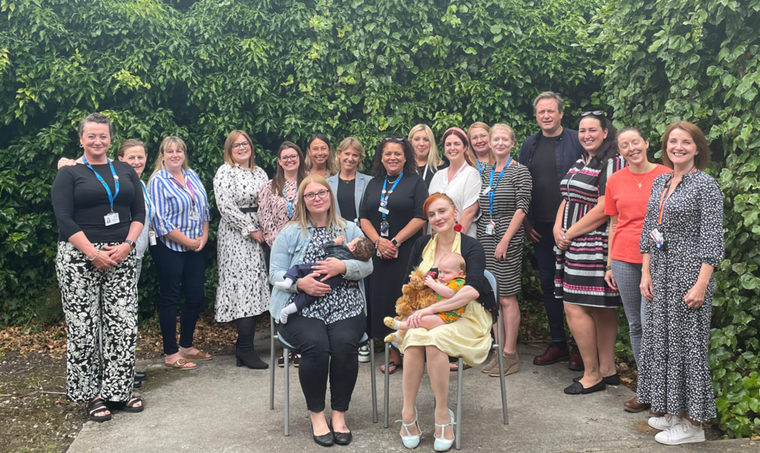Posted By: Nikki Wilson
3rd August 2023
3 minute read

Last week, I spent the most inspiring day with the Specialist Perinatal Mental Health Team (PMHT) and professionals from across the perinatal pathway at Humber Teaching NHS Foundation Trust, in partnership with NAViGO.
The PMHT service was developed by Humber Teaching NHS Foundation Trust in 2010, with just three members of staff. Since then, there has been a rapid expansion to support an increasing number of women, babies and families across Hull, East Yorkshire, North and North East Lincolnshire; a huge area with significant deprivation in parts.
Over the past year, the service has adopted an ‘open door’ policy and increased referrals threefold, which is reflected in more women having face-to-face contact without impacting the quality of care that they receive.
On arrival, I was met by Claire Marshall, specialist perinatal mental health nurse and clinical lead, who hosted the visit and an array of professionals, including the others from the PMHT, specialist PMH midwife, specialist PMH health visitor, occupational therapists, specialist PMH social workers, CBT therapists, the early years team and local authority leads for the newly launched Family Hub. I learned so much from the team, especially those with expertise in perinatal eating disorders and tokophobia.
I also met two mums and their beautiful babies, who are brilliantly supported by the team. Victoria, mum to Busby, explained how it took being pregnant to get treatment for “a lifetime of mental illness”. Similarly, Sarah, new mum to baby Jordan, told me that her mental health has “never been better” after significant trauma and subsequent struggles with addiction.
This appears to be a truly integrated and multi-disciplinary team, demonstrating mutual respect across the pathway with everyone bringing equal value. What struck me most was:
I was curious… is it impressive system design or amazing individuals that make all this happen? In truth, it appears to be both. Every morning, without fail, there is a check-in, not only to share any concerns for patients who may be particularly at risk and/or unwell but also to check on each other. This emphasis on staff wellbeing was clear from my visit, evidenced by the team’s exemplary sickness and retention rates.
This is not to say there aren’t challenges. Katy Morley, whose snappy title is ‘Specialist Perinatal Mental Health Nurse and Service Development Manager with the Perinatal Mental Health Liaison Team, and Humber Teaching NHS Foundation Trust and Clinical Lead for the Yorkshire and the Humber Clinical Network for Perinatal Mental Health NHSE’ (and *breathe*), delivered a PowerPoint on an ageing projector propped up by a book; there were ongoing calls for staff to move their cars in a building estate full to the brim; offices include urinals from when it was an in-patient psychiatric unit. The team rise above this with humour and good grace.
They are more concerned with the barriers which impact families’ ability to access the PMH care they need and deserve, namely:
Despite these real challenges, what I saw here is what I see throughout the PMH community: exceptional passion, commitment, and drive to do the absolute best for women, babies, and families at this extraordinary time of life.
My day ended with a conversation about matrescence with Jane Matfin Specialist PMH Nurse and Clinical Lead, which will stay with me always. But that’s for another day…
The MMHA exists to ensure that every mum, baby, and family in the UK impacted by PMH problems receives high-quality, compassionate care close to home. This means ensuring that essential PMH services, like the PMHT in Humber, have appropriate funding and adequate resources to sustain their essential work.